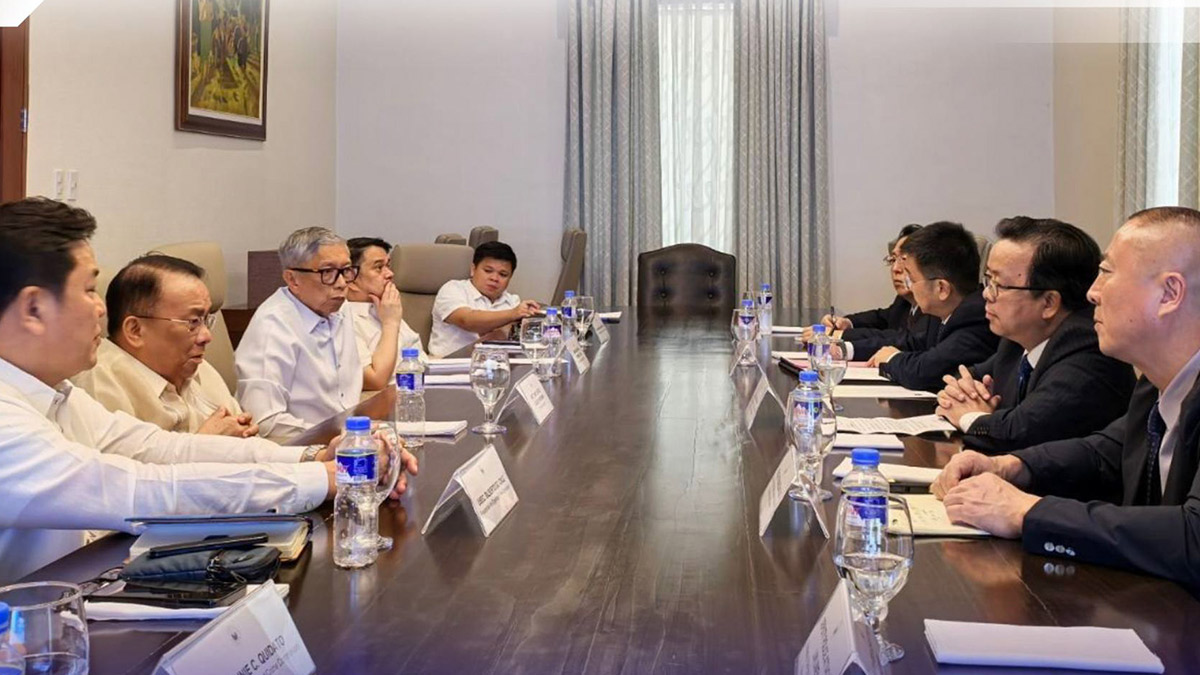
NO TENSIONS HERE The Presidential Anti-Organized Crime Commission released this photo on Tuesday of the “significant meeting” between the government led by Executive Secretary Lucas Bersamin (second from left) and the Chinese side led by Ambassador Huang Xilian. The July 1 meeting centered on the concerns posed by illegal Philippine offshore gaming operators (Pogos).
MANILA, Philippines — Following weeks of pointed exchanges in the diplomatic and military spheres, Executive Secretary Lucas Bersamin and Chinese Ambassador Huang Xilian met on Monday in Malacañang to discuss “mutual concerns,” particularly transnational crimes.
The meeting, which came days after the June 17 attack by China Coast Guard (CCG) personnel of Filipino troops en route to Ayungin (Second Thomas) Shoal in the West Philippine Sea, was held to explore ways to strengthen bilateral efforts against transnational criminal activities, including countering illegal offshore gambling operations, according to the Presidential Anti-Organized Crime Commission (PAOCC), which is chaired by Bersamin.
READ: Bad for relations: China presses PH to ban Pogos
“China expressed its appreciation for the recent actions taken by Philippine law enforcement authorities to counter illegal offshore gambling and to rescue several Chinese nationals,” the PAOCC said in a statement on Tuesday.
Clear message
Officials from the Chinese Embassy in the Philippines, according to the PAOCC, have been actively collaborating with their Philippine counterparts on this issue.
READ: Chinese embassy appeals to PH to ban Pogos to root out social ills
“This mutual support demonstrates the commitment and determination of both countries to curb transnational organized crime effectively,” the PAOCC said.
The strengthened cooperation between China and the Philippines, according to the PAOCC, “sends a clear message to criminal syndicates operating across borders that their malicious activities will not be tolerated nor allowed to undermine the security and stability of these nations.”
It said the meeting also paved the way for “the exchange of expertise, intelligence sharing, and collaborations, enabling the authorities on both sides to disrupt and dismantle criminal networks effectively.
In a separate statement issued by the Chinese Embassy, the two sides exchanged views on recent key cases of mutual concern and agreed “to strengthen China-Philippines law enforcement cooperation.”
The embassy did not specify which transnational crime was discussed, but the more controversial ones of late involved Chinese nationals arrested for links to illegal Philippine offshore gaming operators (Pogos).
Last month, the embassy urged the government to ban Pogos for having engendered other serious crimes.
“Ample evidence shows that Pogo breeds serious crimes, such as kidnapping for ransom, human trafficking, and murder. Pogo is detrimental to both Philippine and Chinese interests and images, as well as China-Philippines relations,” the embassy said in a statement on June 14.
“The Chinese government is committed to protecting the legitimate rights and interests of Chinese citizens. We appeal to the Philippines to ban Pogo at an early date so as to root out this social ill,” the statement added.